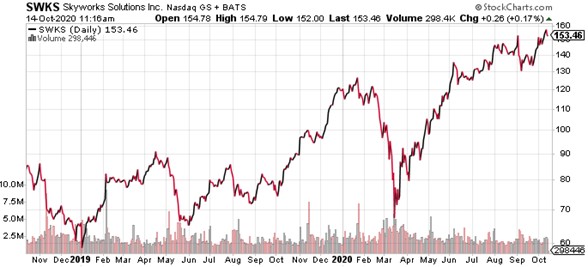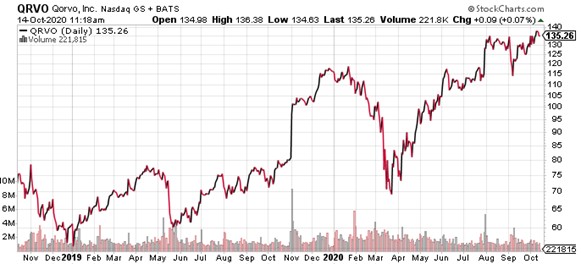5G iPhones are finally here. But don’t get carried away by the hype. Sure, Apple (AAPL) is the shiny big brand that will grab consumer attention. But as an investor, you should be smarter, asserts Jon Markman, tech sector specialist and editor of Pivotal Point.
Let’s start at the beginning. Apple just recently showed off four redesigned iPhones, all supporting 5G, a wireless standard offering internet connection speeds up to 100x faster than older phones.
In many ways, Apple is late to the 5G party. Samsung and Huawei, its major competitors in the high-end smartphone market, rolled out fifth-generation wireless technology last year. Even Motorola Solutions, Inc. (MSI), LG and Google (GOOGL) have been able to trot out competent 5G devices to the midrange marketplace.
All these companies benefitted from better relationships with Qualcomm (QCOM), the world’s leading designer of 5G radios for mobile devices.
Until last year, the San Diego, Calif-based company and Apple were mired in a protracted legal dispute over royalty payments. Basically, Apple managers felt Qualcomm was charging too much. Settling the legal fracas pushed up the 5G iPhone timeline. All the new handsets revealed Tuesday will get 5G.
This change could not have come at a better time for Apple. The Cupertino, Calif.-based company has struggled to grow iPhone sales since 2015. Adding 5G wireless connectivity is going to be a major upgrade for most new iPhone buyers. But as an investor, Apple represents only a fraction of the real potential to be found in this story.
Your focus should be on Skyworks Solutions (SWKS) and Qorvo (QRVO) — the component suppliers that make the new devices speedier. Why? Because the new iPhones are just the start of something big for Skyworks and Qorvo.
Skyworks Solutions makes custom semiconductors for the radio frequency systems used by handset makers and wireless providers. Its amplifiers, switches and other components work with 5G radios to deliver better signals, routing and network capacity.
In 2019, the company won a slew of new contracts from Samsung, LG, Huawei and other Chinese firms as they began rolling out new 5G devices. Sales to telco equipment firms also began ramping up, especially in China, a market serving 780 million smartphone subscribers.
Skyworks managers understand 5G is a big development. They are quickly rolling out new products for the automotive and the internet of things market. However, at 51% of 2019 sales, Apple remains by far the firm’s biggest customer.
Qorvo gets 33% of its sales from Cupertino. Like Skyworks, the company makes custom silicon modules for handset and telco equipment companies trying to make the most of 5G connectivity. During a conference call with analysts in June, CEO Robert Bruggeworth said wireless providers are racing to build out their 5G networks.
He noted that global base station deployments are expected to grow from 750,000 units in 2020 to over 1 million locations in 2021. He also said the company had a number of big sub-6 design wins, leading to record sales for its networking gear.
Meanwhile, high-margin 5G component sales to handset makers has been offsetting sluggish unit volume growth worldwide. Presently, Qorvo 5G modules pull in $5 to $7 per device.
These sentiments were echoed in July by Liam Griffin, CEO at Skyworks. During the third-quarter earnings conference call, he reported that the company achieved 31.3% operating margins on the strength of accelerating demand across all geographies and its expensive 5G silicon. In China, Griffin said, 60% of all devices sold during June were 5G handsets.
Apple is an important customer for both Skyworks and Qorvo. Its iconic iPhones often set the standard for both design and technology thresholds.


As Apple handsets finally cross the line to 5G, it means new devices from every manufacturer will have to deliver the same going forward. It also means faster base station deployment.
Investors should focus on the companies that directly benefit from that advance. Skyworks and Qorvo trade at 22 times and 18 times forward earnings, respectively. Their shares are inexpensive given the coming 5G wave. Growth investors should consider buying shares into any near-term weakness.










